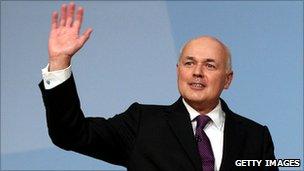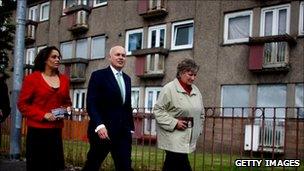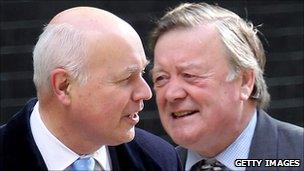Profile: Work and Pensions Secretary Iain Duncan Smith
- Published

Will Iain Duncan Smith's focus on fighting poverty help or damage the poor?
At this year's Conservative Party conference, Iain Duncan Smith, the Work and Pensions Secretary, was introduced as a round peg in a round hole. The man who was a failure as party leader has at last found his niche.
His department accounts for about a third of public spending, so welfare reform will be at the heart of Wednesday's spending review.
In the job he has now, he has reinvented himself, and won the admiration of his party.
It is Iain Duncan Smith, or IDS as he is widely called, who is credited with moving the Conservative Party back to the centre ground on poverty and public services.
This is not what you might have expected from a pin-striped former Guards officer on the right of his party.
So what sort of man is he?
The Tory MP Bernard Jenkin, who was his campaign manager, points out that IDS is "not emotionally available. For someone who is so closely associated with compassion he is personally very old-fashioned you might say".
Samurai stock
But IDS can be funny. He is a talented mimic and - as befits the youngest of five children - is happy to be teased.
But he does sometimes rub people up the wrong way.

IDS returned to the Easterhouse estate in Glasgow to help campaign in a by-election
Mr Duncan Smith, now 56, had a very stable childhood with an old-fashioned and Christian upbringing.
His father was a highly decorated fighter pilot who downed 19 enemy planes during World War II. His mother was a ballerina and his great-grandmother was Japanese, from Samurai stock.
His most formative memory is of watching his much-admired father with tears streaming down his face at Churchill's funeral. He had never seen his father cry before.
At 14, Mr Duncan Smith was sent to HMS Conway, a boarding school on Anglesey for boys aiming to join the Navy.
Clive Plummer was a schoolmate and remembers that: "We didn't have any cleaners, so brushing parade decks, cleaning classrooms and dorms were all managed by the cadets. So in managing teams, you would make sure that not only were the most able utilised but also the less gifted.
"Now that [IDS] is managing social programmes in society," Mr Plummer points out, "recognising effort and ensuring there's a reward for hard work - that sort of accent fits in with the ethos I was brought up with, and so was Iain."
Mischievous
The young Iain was not particularly academic, but he was very sporty. He won the national schools' triple jump and came second in javelin.
He later joined the Army and went to Sandhurst, but not university. Michael Mitchell met him while he was serving in Germany and says that he was not like your average Guards officer. He read widely, wrote poetry and painted.
He was also mischievous.
"He was best man at my wedding in Belgium," Mr Mitchell said.
"At Belgian weddings the bride, groom and parents have to stand in a line and receive guests for two, three hours, and I had a call of nature and asked Iain to stand in my place. And when people asked: where's Michael? He'd say - 'ooh, the last time I saw him he was walking down the road with his suitcase', or he'd say: 'Madam, are you sure you're at the right wedding?' Typical Iain - wanting to inject fun into something."
But no-one then thought he had political ambitions.
IDS left the Army against his father's wishes after just six years, and joined the defence company GEC-Marconi. His Conservative Party biography claimed he was a director, which was not correct. And his own biographical notes said he studied for a degree at Perugia University, when he only did a language course in that city.
In 1982, he married Betsy, daughter of Lord Cottesloe. They have four children, now in their late teens and early 20s.
Disastrous leader
IDS entered the Commons in 1992, in Norman Tebbit's old seat of Chingford and Woodford Green.
As a Euro-sceptic he rebelled over the infamous Maastricht treaty, knowingly risking his chance to get a promotion to government. He told his former press secretary Nick Wood: "I'll fight for what I believe and if I don't get a job - so be it."
The then Prime Minister John Major never did give IDS a job, but when William Hague became party leader he appointed the Maastricht rebel to shadow defence and then social security.
It was a surprise to everyone when he ran for the Tory leadership in 2001. It was perhaps even more of a surprise that he won, having reached the run-off by only one vote.
He defeated the runner-up, former Chancellor of the Exchequer, Kenneth Clarke, only because he was more sceptical on Europe.
He really was the accidental leader. Tim Montgomerie, who now runs the Tory activist website, ConservativeHome.com, wrote speeches for him and eventually became his chief of staff. He says that, as leader, IDS was "completely unprepared. He had no staff, no infrastructure, no worked-out agenda".
Mr Duncan Smith knew that the Tories had to shake off the image of being the so-called "nasty" party. His response was to shift the focus towards public services - like health and education - and tackling poverty.
Personal mission
A formative experience was a trip to the sink estate of Easterhouse in Glasgow.
Mr Montgomerie remembers that "on that cold grey day when he visited Easterhouse and was taken round by a Baptist minister, and stopped in a stairwell where he saw paraphernalia of drug abuse next to a child's teddy - something came together.
"Something suddenly clicked," Mr Montgomerie adds. "He realised here was his personal mission and a mission for the Tory party."
His problem though, was that he was struggling to connect with the political establishment.
He did try, such as when he told the Tory conference in 2002: "There are those who do not know me yet, who will come to understand this. When I say a thing I mean it. When I set myself a task I do it. When I settle on a course I stick with it. Do not underestimate the determination of the quiet man."
Labelling himself "quiet" was not considered a masterstroke in political rhetoric.
Forced out
Stuart Wheeler, then one of the Tory party's biggest donors, threatened publicly to withdraw his funding unless IDS went.
"As leader I think he was a disaster," he said.
"He lacked gravitas and came over as weak. He was a bad communicator. One read that he was high-handed with his staff and that his office was shambolic. He'd lose important papers down the back of sofas."
In the end, Mr Duncan Smith's own MPs forced him out through a vote of no confidence.
Enoch Powell once said that all political careers end in failure, but for Duncan Smith, failure came in the middle of his career instead.

Former leadership rivals IDS and Ken Clarke (R) now work together in Cabinet again
For after losing the leadership, he decided to devote himself to improving the lot of the poor.
He set up the Centre for Social Justice, whose work became the cornerstone of Conservative policy on welfare reform, and which he himself is now putting into practice in government. It has already caused controversy, with opponents claiming the poor will be hardest hit by the government's spending cuts.
But it remains his belief that the best way to alleviate poverty is to get people off benefits and into work. He now has to convert this into hard policy.
He has won a bruising battle with the Treasury to introduce one universal credit which will guarantee to make work pay - the biggest welfare reform since Beveridge, according to the Chancellor, George Osborne.
And what has given IDS his new power?
"One of the things that makes Ian formidable is that [the prime minister] knows he has no ambition other than reforming welfare," said Tim Montgomerie.
"He's been leader. He's doing the job that all his life has been working towards. David Cameron knows he will walk away if he can't implement what he wants, and that would leave the government's poverty agenda in a difficult place."
- Published5 October 2010